- Home
- Hammond Innes
Medusa
Medusa Read online
Medusa
Hammond Innes
To
My wife’s cousins,
the John Langs, father and son,
who, when in command, have done so
much over the years to involve
me in the work of the
Royal Navy.
Contents
Part I THUNDERFLASH
Chapter One
Chapter Two
Chapter Three
Chapter Four
Part II MALTA INCIDENT
Chapter One
Chapter Two
Part III MERCENARY MAN
Chapter One
Chapter Two
Part IV BLOODY ISLAND
Chapter One
Chapter Two
Part V BOARD OF ENQUIRY
Chapter One
A Note on the Author
I
Thunderflash
Chapter One
I was at the office window, looking out over the still waters of the harbour and watching a small boat break the reflection of Bloody Island’s hospital ruins, when he drove up. It was our first real spring morning, the air fresh and clear, red roofs shining in the sun of the promontory opposite and the sounds of the port coming with great clarity across the water. He was driving one of those small Italian cars hired out to tourists and I watched idly as he backed it into the raw parking lot we had recently bulldozed out where the roadway stopped abruptly at the water’s edge.
The local people had thought us mad to set up shop in this cul-de-sac on the east side of the Cala Figuera. It was so far from the main waterfront highway and almost overhung by the cliffs on which the small town of Villa Carlos was built. But we were close to the Atlante, one of the best restaurants in Mahon, and we had found that people liked an excuse to come to this rather wild little spot that gave them a totally different view of the harbour.
I glanced at my watch, looking down at him, still idly, as he got out of the car and stood there in the sunshine, gazing out to the small motor boat now clear of Bloody Island and cutting a broad arrow as it headed towards Cala Rata on the far side of the harbour. It was not yet eight, early for anybody to visit us on business, and at that hour you don’t expect the arrival of somebody destined to shatter your whole life. Nevertheless, there was something about him, his hesitation perhaps, or the way he held himself – I couldn’t take my eyes off the man.
He seemed to brace himself, closing the car door and turning abruptly. But instead of crossing the roadway, he stood there, still hesitant, his hair gleaming black in the sun. He had the sturdy compactness of a climber, or a man who played games, and he was good-looking; neatly dressed too, in blue trousers, white short-sleeved shirt open at the neck, and his bare arms had the paleness of somebody who had spent the winter in the north. He glanced up at the open window where I was standing. It was a big bay window we had built out over the roadway to give us more room in the tiny office. He could not help seeing me and he began to cross the road.
But then he checked, stood staring for a moment at the chandlery, then turned quickly and strode back to the car.
The door below me slammed shut and Carp came out, walking across the road to his motor bike, which was parked as usual against one of the old bollards. He was dressed in overalls with a thick cardigan over the top, the bald patch at the back of his head catching the sun.
Carp was the only Englishman we employed. He was an East Coast man, and that cardigan, or some form of woollen pullover, was never discarded until it was hot enough to melt the tar on the Martires Atlante opposite. He looked after our boats. His full name, of course, was Carpenter and he always left for the naval quay about this time of the morning. But instead of starting off immediately, he paused after jerking the bike off its stand, turning to look back at the driver of the Fiat.
For a moment the two of them were quite still, facing each other. Then the visitor reached out and opened the door of his car, ducking his head inside, searching for something, while Carp began to prop the bike up on its stand again. I thought he was going to speak to the man, but he seemed to think better of it. He shook his head slightly, half-shrugging as he kick-started the engine.
As soon as he was gone the visitor came out from the car’s interior and shut the door again, standing quite still, watching until the motor bike disappeared round the bend by the restaurant. He was frowning, his rather square, clean-cut features suddenly creased with lines. He turned slowly, facing towards me, but not looking up, and he just stood there, still frowning, as though unable to make up his mind. Finally, almost reluctantly it seemed, he started across the road.
Our premises were the only buildings there, so I called down to him and asked if he wanted something from the chandlery.
He checked abruptly, head back, looking straight up at me. ‘Am I too early?’ He said it as though he would have been glad of an excuse to postpone his visit.
‘The door’s not locked,’ I said.
He nodded, still standing there. Only a few years separate us in age, but at that first meeting he seemed very young.
‘What is it you want?’
‘Just a chart.’ He said it quickly. ‘Of Mahon and Fornells. And one of the island as a whole if you have it. Admiralty Charts 1466 and 1703.’ He rattled the numbers off, then added, all in a rush, ‘Are you Michael Steele?’
I nodded, looking beyond him to the sharp-cut shadows of the old hospital, the peace of the harbour, resenting his intrusion. It was such a lovely morning and I wanted to get out on the water.
‘I think you know a Mr Philip Turner.’ He said it hesitantly.
‘Phil Turner?’
‘Yes, owns a yacht called Fizzabout. If I could have a word with you …’ His voice trailed away.
‘All right, I’ll come down.’ Two years back I had skippered Fizzabout in the Middle Sea Race and Phil had laid up with us the following winter.
It was dark on the stairs after the sunlight. The bell over the door rang as he entered the chandlery and Soo called out to me from the kitchen to check that I was answering it. Ramán usually looked after this side of the business, but I had sent him over to Binicalaf Nou with the materials for a villa we were repainting. ‘So you’re a friend of Phil’s,’ I said as I reached the trestle table that did service as a counter.
There was a long pause, then he muttered, ‘No, not exactly.’ He was standing just inside the door, his back to the light and his face in shadow. ‘It was Graham Wade suggested I contact you. He and Turner, they both belong to the Cruising Association. Have you met Wade?’
‘I don’t think so.’
Another long pause. ‘No, I thought not.’ And he just stood there as though he didn’t know how to proceed.
‘You wanted some charts,’ I reminded him. ‘The large-scale chart of Port Mahon and Fornells also gives details of the passage between Ibiza and Formentera.’ I knew the details of it because there was a regular demand for that particular sheet. I produced it for him, also Chart 1703 which covers the whole of the Balearics. ‘Where’s your boat?’ I asked him. ‘At the Club Maritimo?’
He shook his head, and when I asked him where he was berthed, he said, ‘I haven’t got a boat.’
‘You on a package tour then?’
‘Not exactly.’ He produced a wad of peseta notes and paid for the charts, but he didn’t leave. ‘Wade said you’d been living here quite a few years. He thought you’d be the best person to contact – to find out about the island.’
‘What do you want to know?’ I was curious then, wondering why he wanted charts when he hadn’t got a boat.
He didn’t give me a direct answer. ‘Your wife, she’s half Maltese, isn’t she?’ He said it awkwardly, and without waiting for a reply stumbled quickly on – ‘I m
ean, you must know Malta pretty well.’
‘I was born there,’ I told him.
He nodded and I had the feeling he already knew that part of my background.
‘Why? Do you know it?’ I enquired.
‘I’ve just come from there.’ He glanced out of the window, his face catching the light and reminding me suddenly of Michelangelo’s David in Florence, the same straight brows, broad forehead and the wavy, slightly curling hair. It was an attractive face, the classic mould only broken by the lines developing at the corners of mouth and eyes. ‘Grand Harbour,’ he said. ‘It’s not so big as Mahon.’ His voice, still hesitant, had an undercurrent of accent I couldn’t place.
‘No. This is one of the biggest harbours in the Mediterranean. That’s why Nelson was here.’ I still thought he was connected with sailing in some way. ‘It’s not as big as Pylos on the west coast of the Peloponnese, of course, but more sheltered. The best of the lot I’d say.’
His eyes, glancing round the chandlery, returned to me. ‘You’ve done a lot of sailing, have you? I mean, you know the Mediterranean?’
‘Pretty well.’
He didn’t pursue that. ‘Wade said you rented out villas.’
‘Depends when you want to rent. Our main business, apart from boats, is villa maintenance. We only own two villas ourselves and they’re fairly well booked. I’ll get: my wife down if you like. She looks after the renting of them.’
But he was shaking his head. ‘No, sorry – I’m not wanting to rent.’
‘Then what do you want?’ I asked, glancing rather pointedly at the clock on the wall.
‘Nothing. Just the charts.’ I had rolled them up for him and he reached out, but then changed his mind, pushing his hand into his hip pocket and coming up with a photograph. ‘Have you met this man – on the island here?’ He handed me the photograph. It was a full-face picture, head and shoulders, of a big, bearded man wearing a seaman’s peaked cap, a scarf round his neck and what looked like an anorak or some sort of dark jacket.
‘What makes you think I might have met him?’ I asked.
‘Wade thought, if he was here, perhaps he’d have chartered a yacht from you, or he might have come to you about renting a villa.’
‘We haven’t any yachts for charter, only an old converted fishing boat,’ I told him. ‘As for villas, there are thousands here, and a lot of people doing what we do – care and maintenance.’ The man in the photograph looked as though he had seen a lot of life, a very strong face with big teeth showing through the beard, eyes deeply wrinkled at the corners and lines across the forehead. There was something about the eyes. They were wide and staring, so that they seemed to be looking out at the world with hostility. ‘What’s his name?’ I asked.
He didn’t reply for a moment, then he gave a little shrug. ‘Evans. Patrick Evans. Or Jones. Sometimes Jones – it varies. I thought he might be in Malta.’ He shook his head. ‘Wade said if he wasn’t in Malta I’d probably find him here.’
‘He’s Welsh, is he?’ I was still looking down at the photograph, puzzled by something in that hard stare that seemed vaguely familiar. Then, because of the silence, I looked up. ‘A friend of yours?’
He seemed to have some difficulty answering that, his eyes slipping away from me. ‘I’ve met him,’ he muttered vaguely, picking up the charts and tucking the roll under his arm. ‘Let me know, will you, if he turns up.’ And he added, ‘You can keep the photograph.’
I asked him where I could get in touch with him and he scribbled his address on a sheet of paper I tore out of our receipts book. It was in Fornells, a private address, not a hotel. And he had written his name – Gareth Lloyd Jones. ‘Perhaps we could have a drink together sometime,’ he suggested. Then he was walking out with an easy, almost casual wave of the hand, all the hesitancy gone as though relieved to get away from me and out into the sunshine.
I watched him drive off and then my gaze returned to the photograph. Soo called down that coffee was ready. Weekdays coffee was all we had in the morning. Sunday was the only day we treated ourselves to an English break fast. I went back upstairs, and when I showed her the photograph, she said without a moment’s hesitation, ‘I’m sure he didn’t have a beard.’
I took it to the window, looking at it in the clear sunlight, trying to visualise the man clean-shaven. ‘The eyes were different, too,’ she said, joining me at the window, the bulge of her pregnancy showing through the looseness of her dressing gown.
‘Who is he?’
‘Es Grau, don’t you remember?’ And she added, ‘You’re not concentrating.’
‘How the hell can I?’ I gave her bottom a smack, caught hold of one buttock and pulled her close so that her stomach was hard against me. ‘Any kicks yet?’
She thrust herself clear, turning quickly and pouring the coffee. ‘He was in that little bar-restaurant where they haul the boats up. It was raining and we had a cup of coffee and a Quinta there after we’d looked at that villa out near S’Albufera. Now do you remember? He was with two or three Menorquins.’
She poured me my coffee and I stood sipping it, staring down at the photograph. I remembered the man now, but only vaguely. I had been more interested in the other two. One was Ismail Fuxá. I had never met him, but I had recognised him instantly from pictures in the local press. He was a member of the Partido Socialista, on the extreme left of the party and very active politically. My attention, however, had been focused on the little man sitting with his back to the window. I was almost certain he was the fellow I had chased one evening out near Binicalaf Nou. It had been dusk and I had stopped off to check one of the two villas we had under care in that neighbourhood. As I let myself in through the front door he had jumped out of a side window. He had had to run right past me and I had had a brief glimpse of his face looking scared. I went after him of course, but he had a motor bike parked down the dirt road and he’d got away from me.
When I returned to the villa and went into the big downstairs room I found he had sprayed URBANIZAR ES DESTRUIER right across one wall, and below that the letters SALV … I knew the rest of it by heart, so many villas had been sprayed with it – SALVEMO MENORCA. ‘Yes,’ I said. ‘I remember now. But it was months ago, last autumn.’ I was thinking of all that had happened since, the orchestrated build-up of hostility by the separatists. ‘That was the first,’ I added, gazing out at the limpid harbour water where a cruise ship showed white against the far shore.
‘The first what?’ Her back was turned as she filled her cup.
‘The first of our villas to be daubed.’
‘They’ve only sprayed two of them, and they’re not ours anyway. We only look after them.’ She turned, cup in hand, pushing her dog out of the way with a bare foot. It was a basenji so we called it Benjie and it slept on her bed, a pleasant little fellow all dressed in café-au-lait with a long, serious head, a perpetual frown, spindly legs and a curlycue of a tail. It was barkless and I could never understand the purpose of a dog that was a virtual mute. ‘I’ve got something in mind,’ she said. ‘I want to talk to you about it.’
I knew what was coming then and turned my back on her, gazing out of the window again. ‘Just look at it!’
‘Look at what? You haven’t been listening.’
‘The morning,’ I said. ‘The sun on the water, everything crystal bright.’ And I began to sing, ‘Oh, what a bootiful mornin’, Oh, what a bootiful day … Remember that moonlit evening in the courtyard of your mother’s house, the old gramophone?’ I tried to grab her, thinking to take her mind off her obsession with property. But she evaded me, eyes gone black and suddenly wide, hands across her belly. ‘Go on,’ she said. ‘Finish it, why don’t you?’
‘I got a bootiful feelin’. Everything’s goin’ ma way.’
She came back to the window then, gazing out, but not seeing the sunshine or the golden gleam of the water. ‘That’s the feeling I’ve got,’ she said, and she was looking straight at me. ‘Miguel rang last night.’ I could s
ee it in her eyes. For weeks she had been on at me to take advantage of the rash of villas that had recently come on to the market. She put her cup down, then turned to face me again. ‘It was just before you came in. I didn’t tell you because we were already late for the Rawlings’, and afterwards … Well, it wasn’t the moment, was it?’
‘What did Miguel want?’ Miguel Gallardo was the contractor we used when there was maintenance work we couldn’t handle ourselves. He was now building a villa out on Punta Codolar, a bare, bleak headland in the north of the island that was crisscrossed with the half-completed roads of a new urbanizatión.
‘He needs help,’ she said.
‘Money?’
She nodded. ‘It’s all this build-up of trouble in the Med, of course – Libya in particular. The American he’s building for has suddenly got cold feet and wants out. He’s offering Miguel the whole place in lieu of what he owes him.’ She reached out, her fingers gripping my arm as though she had hold of the villa already. ‘I had a look at it with Petra when you were delivering that boat to Ajaccio, and now he says we can have it, as it stands, at cost. We pay Miguel’s account, and that’s that – it’s ours.’ She gave me the figure then, adding, ‘It’s a chance in a million, Mike.’
‘Miguel to complete, of course.’
‘Well, that’s only fair.’
‘It’s barely half-completed, remember.’ But it wasn’t the cost of completion I was thinking about. It was the political tension building up locally. ‘There’s been windows broken, one villa set on fire, another smashed down by a runaway road roller …’
‘That’s just a passing phase.’ I shook my head, but she went on quickly: ‘It won’t last, and when the panic is over, a lot of people will be cursing themselves for putting their villas on the market at knockdown prices. I’m thinking of the future.’ The cups and plaques on the shelves behind her glimmered bright with memories of days gone. What future? She kept them so well polished I sometimes felt it was the crack shot, the Olympic sailor, the image she had of me, not myself, not the essential lazy, mediocre, ill-educated – oh hell, what deadly blows life deals to a man’s self-confidence! Maybe she was right, polish the mirror-bright image, retain the front intact and forget the human freight behind. And now she wasn’t thinking of us, only of the child. She had less than two months to go, and if this was another boy, and he lived … I hesitated, looking out to the bay. She had a good head for business and a highly developed sense for property, but politically – she was a fool politically. ‘It’s too lovely a day to argue,’ I said, thinking of the smell of cut grass on the Bisley Ranges, the whiff of cordite in the hot air, gun oil and the targets shimmering.

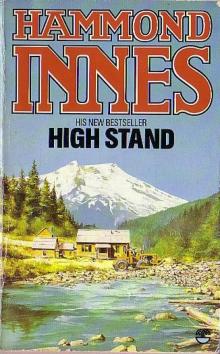 High Stand
High Stand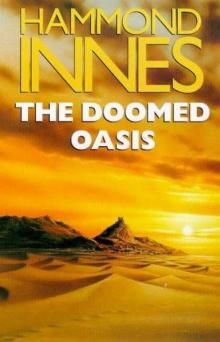 The Doomed Oasis
The Doomed Oasis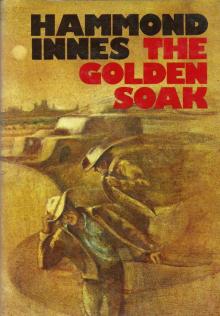 Golden Soak
Golden Soak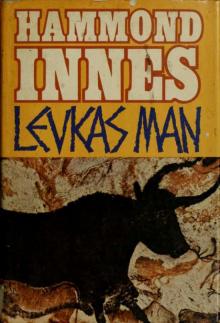 Levkas Man (Mystery)
Levkas Man (Mystery)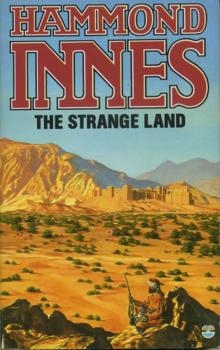 The Strange Land
The Strange Land Dead and Alive
Dead and Alive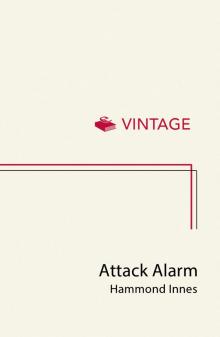 Attack Alarm
Attack Alarm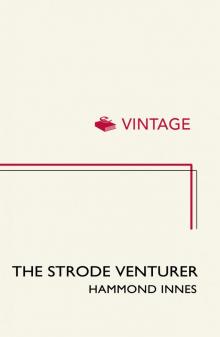 The Strode Venturer
The Strode Venturer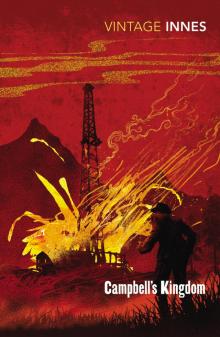 Campbell's Kingdom
Campbell's Kingdom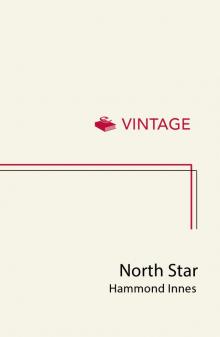 North Star
North Star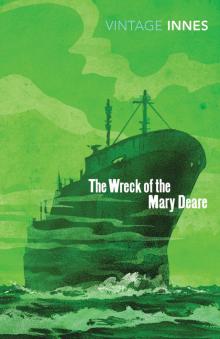 The Wreck of the Mary Deare
The Wreck of the Mary Deare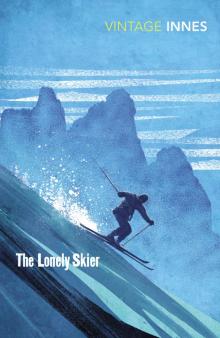 The Lonely Skier
The Lonely Skier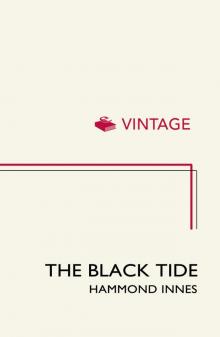 The Black Tide
The Black Tide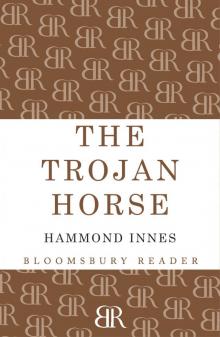 The Trojan Horse
The Trojan Horse Medusa
Medusa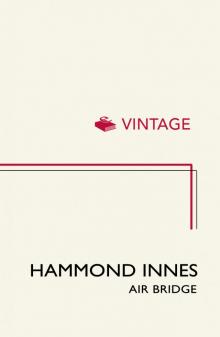 Air Bridge
Air Bridge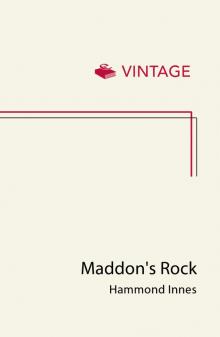 Maddon's Rock
Maddon's Rock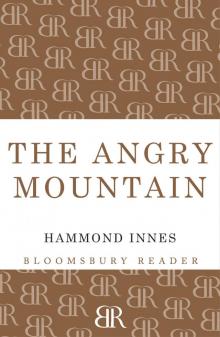 The Angry Mountain
The Angry Mountain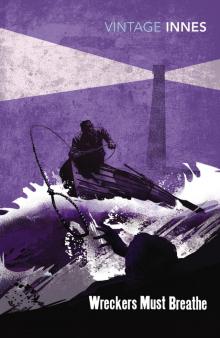 Wreckers Must Breathe
Wreckers Must Breathe Solomons Seal
Solomons Seal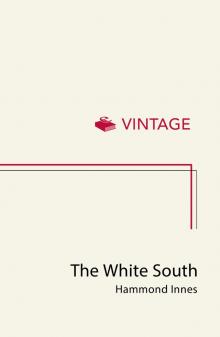 The White South
The White South